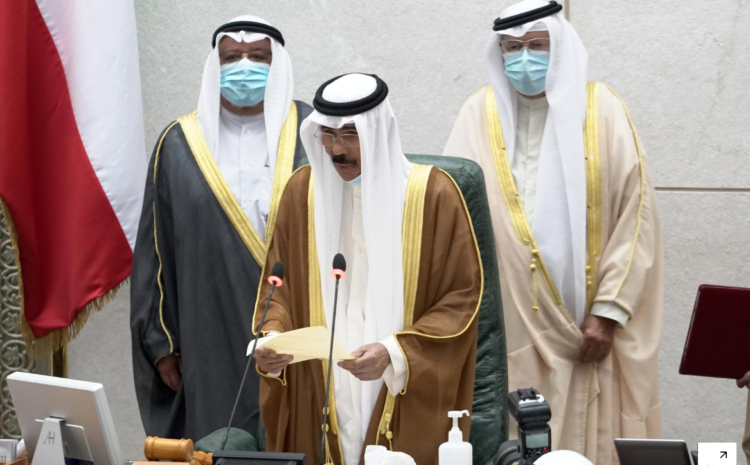KUWAIT (Reuters) – Kuwait’s new emir was sworn in at parliament on Wednesday as the country prepared to lay to rest late ruler Sheikh Sabah al-Ahmad al-Sabah, a Gulf Arab elder statesman who helped steer his people through some of the Middle East’s most turbulent decades.
The cabinet named designated successor Crown Prince Sheikh Nawaf al-Ahmad al-Sabah as ruler on Tuesday after the death of Sheikh Sabah, 91, whose body arrived in Kuwait on Wednesday from the United States, were he had been hospitalised since July.
The plane was met by royal guard members, each carrying a flag pole at half-staff. At the tarmac, Sheikh Nawaf watched as the body, wrapped in a white shroud and a Kuwaiti flag, was carried to an ambulance.
Nawaf, 83, pledged to work for the OPEC member country’s prosperity, stability and security after taking the oath of office, raising both hands to his head as lawmakers applauded.
“Our dear nation today faces difficult situations and dangerous challenges that can only be overcome … by unifying ranks and working hard together,” he told the National Assembly.
Sheikh Sabah will be buried at the Sulaibikhat cemetery alongside his kin. The funeral has been restricted to ruling family members due to concerns about coronavirus, which along with low oil prices has strained the wealthy petroleum producer’s finances.
The emir of Qatar, which has been boycotted by Saudi Arabia and its allies in a dispute that Sheikh Sabah tried until his death to resolve, will attend the funeral, state media said.
SEASONED DIPLOMAT
When the previous emir, Sheikh Jaber al-Ahmad al-Sabah, died in 2006, thousands of Kuwaitis attended the funeral and many, along with expatriates, lined the streets.
“We honestly feel like we’re gong to be lost without his guidance,” said Fajer, a Kuwaiti woman.
Dignitaries from around the world paid respects to the seasoned diplomat and savvy politician, widely respected as a humanitarian who strove to heal rifts in the Middle East, mending ties with former occupier Iraq, maintaining dialogue with Iran and championing the Palestinian cause.
Analysts saw his death following that earlier this year of Oman’s Sultan Qaboos, who also played a moderating and balancing role in the region, as the end of an era in the Gulf where an aggressive younger generation has risen to power, particularly in Saudi Arabia and the United Arab Emirates which have taken hawkish stands against rival Iran.
“Though the incoming power brokers in neighbouring Gulf countries did not always heed his advice, the Emir was a reminder of an order hard-fought to achieve that was the basis for the goodwill international partners bear the region,” wrote Kirsten Fontenrose, director of the Atlantic Council’s Scowcroft Middle East Security Initiative.
Sheikh Nawaf takes the reins of the small nation, which holds the world’s seventh-largest oil reserves, at a time when the government is trying to boost the finances of a country with a cradle-to-grave welfare system. Oil, investment and foreign policy are not expected to change.
Nawaf is likely to focus on domestic matters such as naming a crown prince who would manage ties with a parliament that has often clashed with the government and hindered economic reform efforts, diplomats and analysts say.
Under the constitution, the emir chooses the crown prince but traditionally the ruling family, some of whose senior members have been jostling for the position, convenes a meeting to build consensus. Parliament also has to approve the choice.
Reporting by Lisa Barrington, Ahmed Hagagy, Dahlia Nehme and Nafisa Eltahir; Writing by Ghaida Ghantous; Editing by Nick Macfie, William Maclean
Our Standards: The Thomson Reuters Trust Principles

